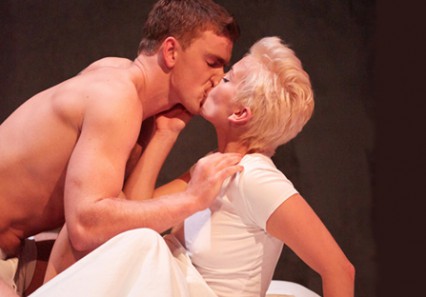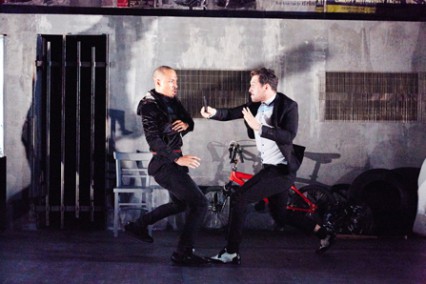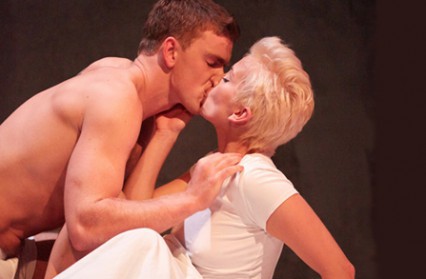Gary Raymond casts a critical eye on Romeo and Juliet directed by Rachel O’Riordan at Sherman Cymru reflected on the statement of intent rather the failure of its execution.
Sherman Cymru
Directed by Rachel O’Riordan
Starring: Chris Gordon, Sophie Melville, Scott Reid

Sherman Cymru’s Romeo and Juliet should probably have two separate reviews. The first would look at the production as mounted on the stage. The second would look at it in the context of this being the first foot on the mountain that new artistic director Rachel O’Riordan has to climb to make the Cardiff theatre a success after the much publicised financial controversy and unsuccessful stewardships. The two reviews would not sit easily next to each other. The second review would suggest that O’Riordan may very well turn out to be a fine choice, someone who is willing to make pragmatic decisions and take big swing chances as she strives to bring a new audience to the theatre. A fast, dark, urban Shakespeare was a sign of real intent. The first review, however, would focus on how that fast, dark, urban Shakespeare was found wanting in the most significant of areas.
Of course, only time will tell as to whether this production has managed to reach out to new audiences, or whether it has not. O’Riordan really does have one hell of a job on her hands at the Sherman, and she deserves all the credit for going at it with such vigour and creative energy. If she continues in this vein, win lose or draw, she will surely come out of this place down the line with a deserved enhanced reputation.

But no long term reflection is needed to evaluate the production itself. The thing looked pretty good, but that was about it, a kind of West Side Story version that promised more than it delivered. O’Riordan played on the potential gangsterism of the Montague/Capulet rivalry, and it seemed to have legs, but then so did many other decisions in the opening stages. It became apparent quite quickly (the introduction of a cocky hoodied Romeo, to be precise) that this is Romeo and Juliet for the Skins generation, but that brought with it a lowliness that mismatched the language; Shakespeare, of course, can be interpreted in many ways – but I’m not sure if Romeo and Juliet is the place to do it squalidly. Everything just tried that little bit too hard to ‘appeal’ to a demographic that quite simply despises being patronised. The promotional material reads ‘a tragedy as relevant today as ever’. Well, this is Shakespeare – the relevance is pretty much a given, and it’s all in the language. Having Nicky Minaj blast out for six seconds between scene changes does not enhance that.
But then this wasn’t really an interpretation of Shakespeare at all, but a dowdy acoustic cover version of Baz Luhrmann’s big dancefloor hit from 1996. The comparison would have been too crass to make had there not been a poster of the movie pasted onto the gritty street scene backdrop throughout. It was an odd and largely disastrous decision to put that up there, hanging over the actors like the portrait of an iconic ancestor whose memory and presence constrains, befuddles and stymies all attempts of his brood to make something of themselves. Every time the play did something verging on the interesting, Luhrmann’s gaze was there to remind you that he did it better, with a keener eye, ear and cast. And the production had its moments. The set design showed strong values and an encouraging discernment for shadow and grunge that promises much hope for future projects – but here it was only half-suited, though, as in the end, the scenes in Juliet’s bedroom were made to look as if she slept on the floor in the cellar. Linden Walcott-Burton was a good Benvolio, steady and conscientious as Scott Reid’s Mercutio dashed around him like an eight year-old filled with propane blue Smarties (one thing worse than an audience being glad to see Mercutio die is to have an audience not care, and Reid died to an insouciant knell). Paul Rattray had authority for the most part as the senior Capulet, and Sara Lloyd-Gregory was his aptly repulsive Lady. The fight scenes had been choreographed within an inch of their lives, and you had to admire the craft even if the drama was a bit lacking. But the failures were bolder, bigger and unfortunately all-devouring.
To begin with the boldest: rarely could there have been a production of a Shakespeare play where every line was delivered so flatly, so thoughtlessly. There was almost no seeming connection between actor and language. It seems crude to point it out, but Romeo and Juliet is overflowing with some of the greatest and most memorable lines in all literature, and here they were met with a weak appetite. These are lines actors dream of delivering. But here they were just delivered half awake.
The Romeo and the Juliet were entirely unconvincing. Chris Gordon’s Romeo had two emotions – hands on hips and hands not on hips. Sophie Melville’s Juliet had early flashes of an extremely interesting interpretation – she started off a very convincing naïve and squawking 13 year-old – but went nowhere with it, and was ultimately all soap opera in her emoting. But again, there was no time for exploring the language here, no time for subtlety, no time for real emotion. Up top of this was a young, talented, but inexperienced cast. It is difficult to criticise them for not reaching the heights they had set themselves. Whether it was panic, nervous energy, or just a misguided understanding of what makes Shakespeare so vital, ‘get the language out of the way as quickly as possible’ seemed the overall mission.
And in the end the biggest problem was the production’s relationship with the text. With Shakespeare, ignore the language at your peril. I don’t think there is a lover of theatre alive who doesn’t want Sherman Cymru to thrive and for Rachel O’Riordan to be a success. This Romeo and Juliet will hopefully be remembered for its statement of intent rather the failure of its conception and execution.



 Enjoyed this article? Support our writers directly by buying them a coffee and clicking this link.
Enjoyed this article? Support our writers directly by buying them a coffee and clicking this link.








